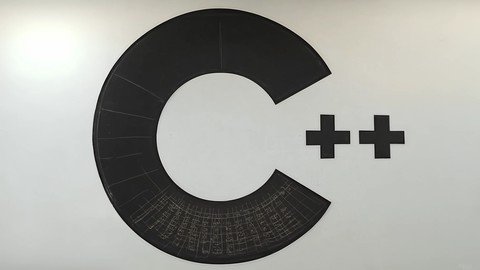Please, rate the engine Author: warezcrackfull on 8-01-2024, 02:40, Views: 0
Respected Sites
Survey
Ads
Warezcrackfull.com » Tutorial » How To Write Solid C++
How To Write Solid C++

Published 1/2024
MP4 | Video: h264, 1920x1080 | Audio: AAC, 44.1 KHz
Language: English | Size: 225.20 MB | Duration: 0h 39m
Design maintainable and reusable C++ for production
Free Download What you'll learn
Understand the essence of SOLID principles
Analyze existing code for SOLID principle compliance
Evaluate the need for refactoring to comply with the SOLID principles
Write C++ that adheres to the SOLID principles, resulting in production-ready maintainable and reusable software
Requirements
Basic understanding of object oriented programming.
Good understanding of polymorphism, classes and inheritance in C++.
Basic familiarity with common STL containers and data structures, such as std::vector, std::string etc.
Description
In this course, we learn how to develop C++ according to the SOLID Principles.Have you ever heard of the SOLID principles? They are design principles that help us write maintainable and reusable code.If you are familiar with SOLID, you might have watched a tutorial or two.Were the tutorials using "Shape" or "Animal" classes in their oversimplified examples?Were they written in Java or focused on some domain you are not interested in?Well, this course is different. First of all, you get a real insight into what the SOLID principles are about. No sugar-coating, no fancy design patterns, or exotic language features.Secondly, the course is in C++. Simple, modern C++ with pragmatic examples you may encounter in production code-bases.Production code is not always perfect, but it is normally not terrible either.Violations of SOLID are subtle, and you will learn to recognize them.Refactoring does not always makes sense, but after this course you will be able to determine when it does.Step-by-step, we go through each principle and map it to well-known programming practices and quality attributes.We look at several practical examples and discuss how they can be improved by following the SOLID principles.We analyze code and identify violations of the principles.Finally, we refactor C++ to make it more SOLID and discuss whether or when that makes sense.You are looking a hands-on course. You will write a lot of SOLID C++ code yourself. There is a lab for each principle, where you will receive a piece of code, analyze it, and then refactor it to make it more SOLID.Intrigued? Ready to take your C++ to the next level? Join me in this course, and let's get started!
Overview
Section 1: Introduction
Lecture 1 Introduction to the course
Lecture 2 Introduction to the labs
Section 2: Single Responsibility Principle
Lecture 3 Single Responsibility Principle
Section 3: Open-Closed Principle
Lecture 4 Open-Closed Principle
Section 4: Liskov Substitution Principle
Lecture 5 Liskov Substitution Principle
Section 5: Interface Segregation Principle
Lecture 6 Interface Segregation Principle
Section 6: Dependency Inversion Principle
Lecture 7 Dependency Inversion Principle
Section 7: Conclusion
Lecture 8 Takeaways and reflections
Beginner to intermediate C++ developers, who want to take their career to the next level,C++ developers who have a passion for crafting maintainable and reusable software for production
Homepagehttps://www.udemy.com/course/how-to-write-solid-cpp/
Buy Premium From My Links To Get Resumable Support,Max Speed & Support Me
Rapidgator
hlgtp.How.To.Write.Solid.C.rar.html
Uploadgig
hlgtp.How.To.Write.Solid.C.rar
NitroFlare
hlgtp.How.To.Write.Solid.C.rar
Fikper
hlgtp.How.To.Write.Solid.C.rar.htmlNo Password - Links are InterchangeableComments
Archived warez downloads
March 2025 (1736)
February 2025 (1900)
January 2025 (2316)
December 2024 (3717)
November 2024 (6839)
October 2024 (2594)
Friends
All rights by WarezCrackFull.com 2024 Sitemap
